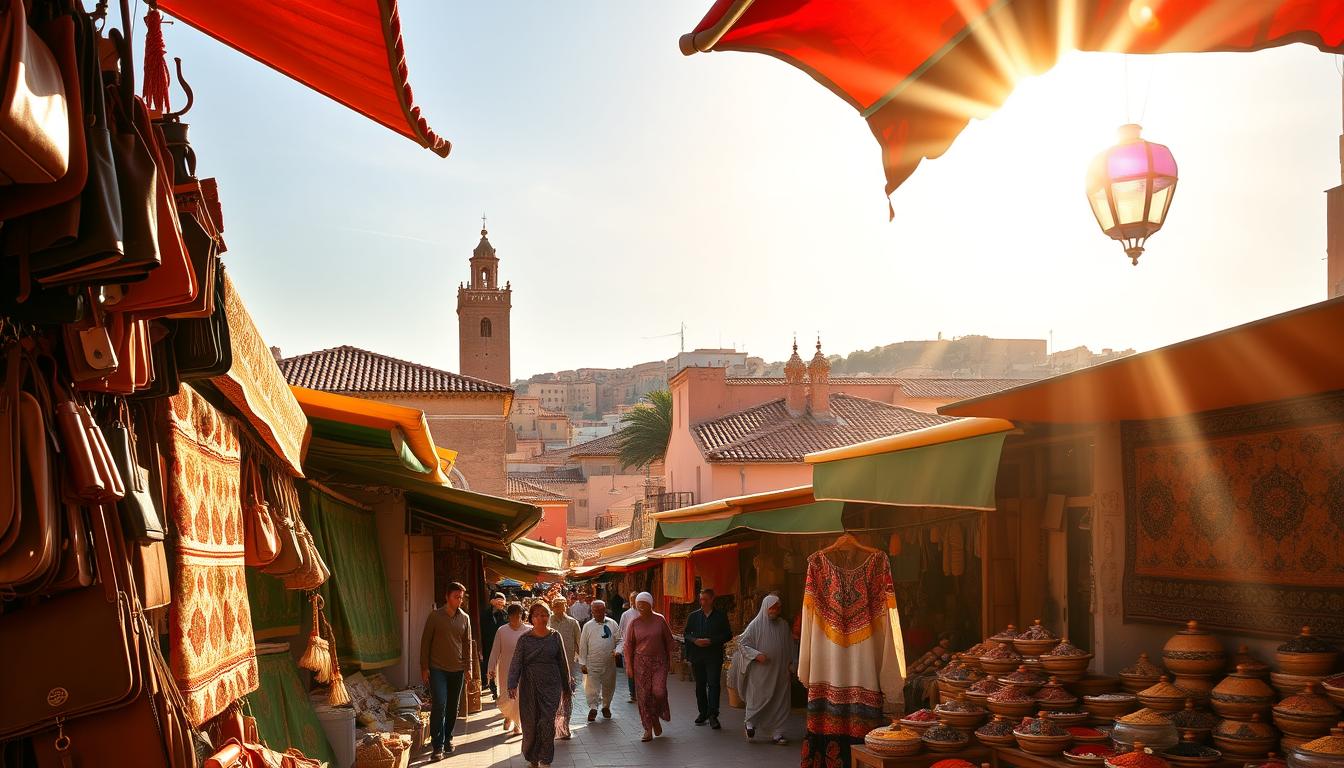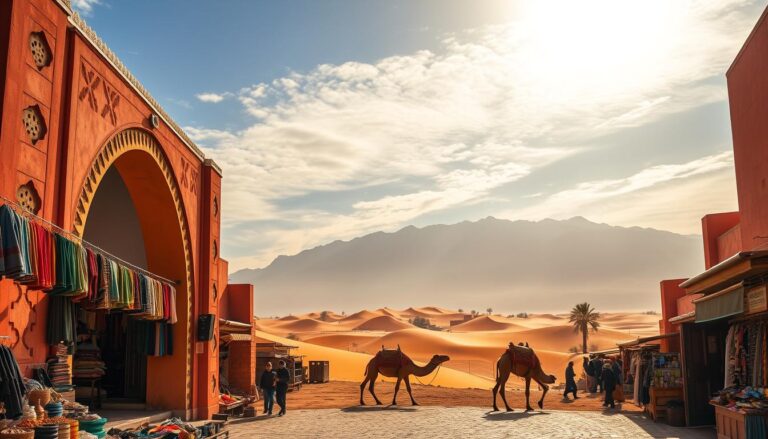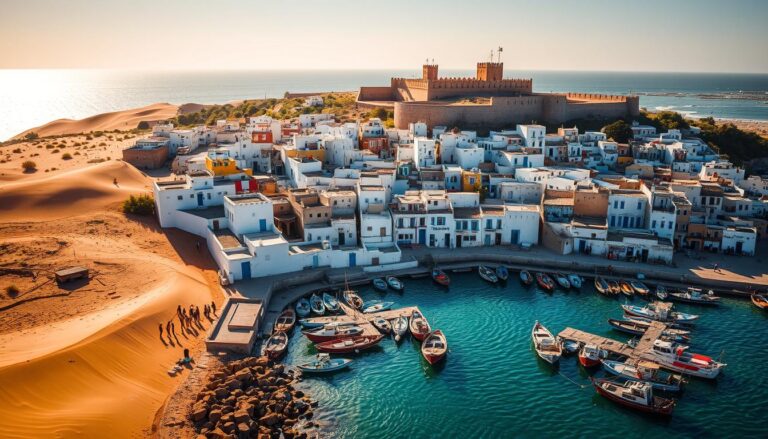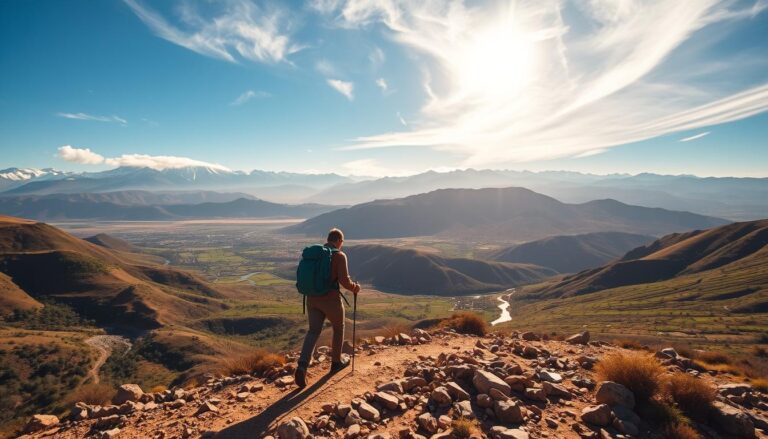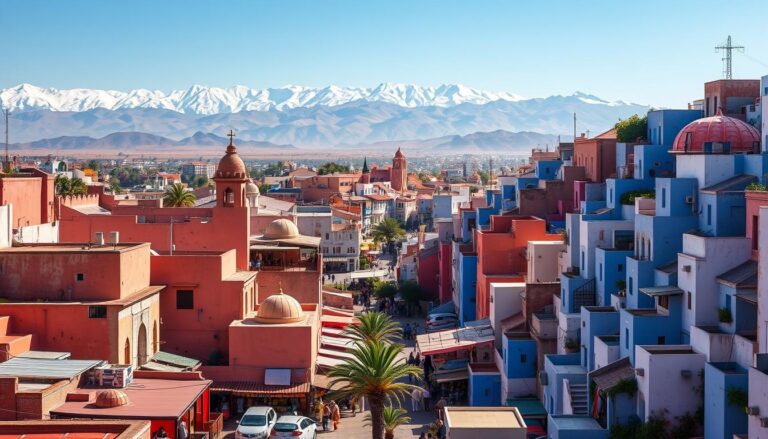Ultimate Morocco Travel Guide 2025: Best Places, Tips & Itinerary
Table of Contents
Did you know over 90% of visitors to North Africa’s cultural hub report feeling safer than expected? This vibrant destination defies stereotypes, blending ancient traditions with modern hospitality. Whether you’re drawn to labyrinthine markets or tranquil mountain retreats, our guide unlocks secrets even seasoned explorers miss.
Discover how to navigate spice-scented alleyways and negotiate like a local while respecting Islamic customs. From riad courtyards hidden behind unassuming doors to sunset camel treks in the Sahara, we’ll show you where timeless magic meets contemporary comfort.
Our advice helps you sidestep common pitfalls – like dressing appropriately for mosque visits or avoiding unofficial guides. You’ll learn when to haggle for ceramics and when to accept mint tea graciously. We’ve even included seasonal weather tips for planning coastal escapes or High Atlas hikes.
Key Takeaways
- Experience seamless journeys using updated transport insights and accommodation recommendations
- Respect local customs by understanding dress codes and photography etiquette in sacred spaces
- Balance iconic landmarks with lesser-known treasures using our curated itinerary suggestions
- Stay informed about current safety protocols without compromising your sense of adventure
- Master essential phrases and cultural gestures to enrich interactions with residents
Overview of Morocco’s Travel Landscape
Few destinations blend ancient traditions with diverse terrains as seamlessly as this cultural crossroads. You’ll discover coastal towns with azure fishing boats bobbing in harbours, while just hours inland, snow-dusted peaks crown the horizon. The country’s ever-changing scenery invites you to pack both sandals and hiking boots.
Major cities dazzle with luxury riads and efficient transport networks, particularly in historic imperial hubs. Venture beyond urban centres, and you’ll find rural villages where traditional Berber lifestyles endure. New motorways and upgraded rail links now connect formerly isolated areas, though some mountain passes still challenge even seasoned drivers.
| Region | Key Features | Best For | Access Level |
|---|---|---|---|
| Atlas Mountains | Hiking trails, Berber culture | Adventure seekers | Moderate |
| Saharan Dunes | Camel treks, stargazing | Unique experiences | Guided tours recommended |
| Northern Coast | Beach resorts, Roman ruins | Family holidays | Easy |
Be mindful of restricted border zones near Algeria, where military checkpoints regulate movement. In Western Sahara, stick to main routes – unexploded ordnance still lurks in remote desert areas. Seasonal weather shifts dramatically: coastal mists cloak Essaouira in summer whilst desert nights turn frosty from December to February.
This North African nation’s strategic position creates fascinating cultural fusions. You might hear Spanish-accented Arabic in northern markets or taste French-inspired pastries in Marrakech cafés. Such diversity lets you craft itineraries mixing UNESCO sites with adrenaline-fuelled escapades across ever-changing landscapes.
Essential Safety and Security Tips in Morocco
Exploring vibrant destinations requires balancing adventure with sensible precautions. While most visits unfold smoothly, understanding potential risks helps you stay one step ahead. Let’s unpack practical measures for navigating public spaces and remote areas confidently.
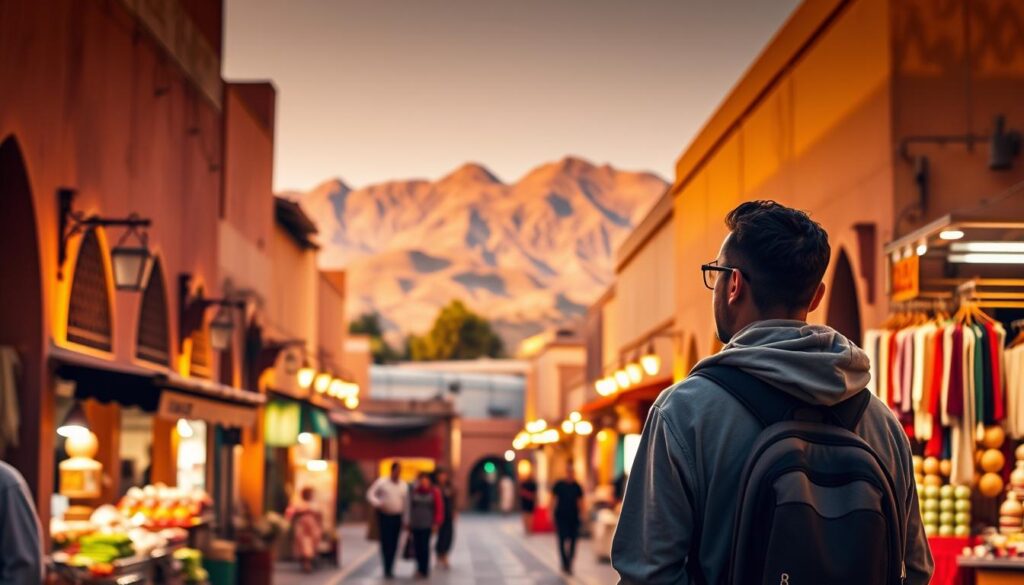
Terrorism and Political Unrest
Stay updated on government travel advisories, particularly regarding crowded spots like markets or transport hubs. The 2018 attack near Imlil underscores why hikers should always hire certified guides in mountainous regions. Avoid political gatherings – even peaceful protests can escalate unexpectedly.
Crime Prevention and Personal Safety
Pickpockets thrive in busy medinas. Use anti-theft bags and keep phones/wallets in front pockets. If confronted, prioritise cooperation over resistance – armed muggings, though rare, demand caution. When withdrawing cash, choose ATMs inside banks during daylight hours.
| Location | Common Risks | Preventive Measures |
|---|---|---|
| Urban Markets | Bag-snatching, scams | Wear crossbody bags, avoid distractions |
| Beach Resorts | Theft from belongings | Use locker facilities, avoid leaving items unattended |
| Mountain Trails | Getting lost, isolated crime | Share itineraries, carry emergency GPS devices |
Choose accommodation with 24-hour security and room safes. In rural areas, verify your hotel’s emergency protocols. Remember: a friendly demeanour and basic Arabic phrases often deter opportunistic thieves more effectively than overt suspicion.
Morocco Travel Regulations, Laws, and Customs
Understanding local expectations ensures your visit remains both respectful and rewarding. The nation’s legal system blends Islamic principles with civil law, creating unique requirements that might surprise British visitors. Let’s explore how to navigate these norms smoothly.
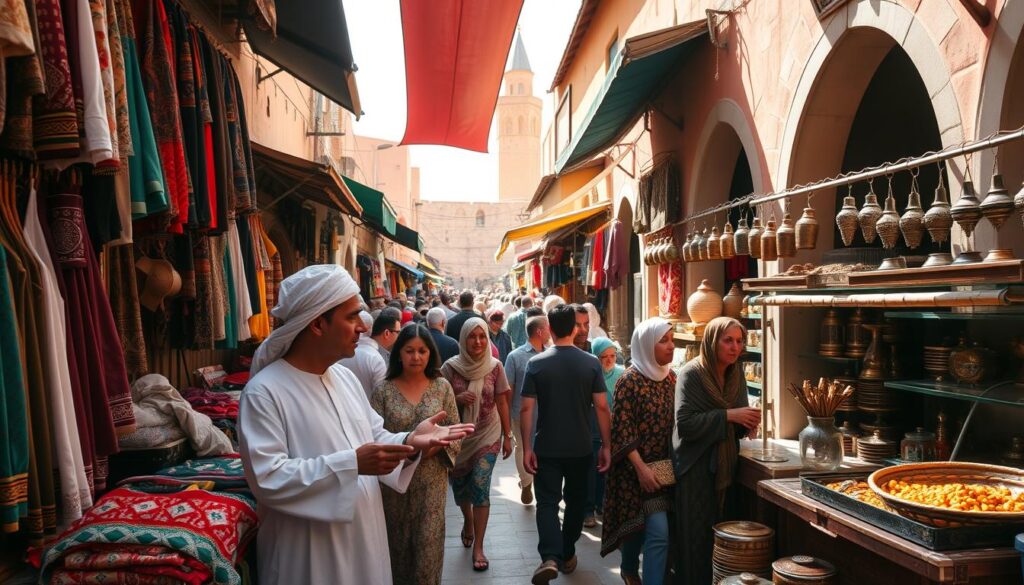
Legal Boundaries and Religious Observances
Public behaviour rules here differ markedly from the UK. Intimate gestures like holding hands could draw unwanted attention – save affection for private spaces. During Ramadan, even bottled water becomes taboo in public view from dawn till dusk.
Photography enthusiasts should note restricted zones. Military sites and government buildings often lack visible signage, so when in doubt, ask permission. A friendly “Hal yumkin al-taswīr?” (May I take photos?) shows cultural awareness.
| Aspect | Cultural Norm | Legal Requirement |
|---|---|---|
| Public Conduct | Modest clothing in religious sites | No alcohol in unlicenced areas |
| Technology Use | Ask before photographing locals | Drone permits from aviation authorities |
| Religious Materials | Qur’an treated with reverence | No proselytising materials allowed |
Dress Standards and Social Interactions
While coastal resorts tolerate shorts and tank tops, covering shoulders and knees shows respect elsewhere. Women might pack lightweight scarves for mosque visits – many historic sites provide loaner garments.
Unmarried couples sharing rooms rarely face issues in tourist hotels, though rural guesthouses may ask about marital status. If questioned, present passports calmly rather than debating cultural differences.
Remember: bringing religious literature for personal use is permitted, but distributing it risks serious penalties. When packing, leave missionary materials at home and enjoy learning about local traditions instead.
Must-Visit Destinations and Attractions in Morocco
From labyrinthine market towns to golden Saharan horizons, this country reveals new wonders at every turn. You’ll find UNESCO-listed medinas whispering ancient secrets alongside adrenaline-pumping mountain trails. Let’s explore where history and nature collide most spectacularly.
Historic Sites and Medinas
Step into Fez’s walled city, where donkeys still haul goods through 9th-century alleyways. Marrakech’s rose-hued souks dazzle with metal lanterns and handwoven textiles. Don’t miss Chefchaouen’s cobalt-blue lanes – perfect for Instagram-worthy snaps without the crowds of larger cities.
Natural Landscapes and Beaches
Swap city bustle for the High Atlas’s walnut groves, where Berber guides share centuries-old hiking routes. Coastal areas offer contrasting pleasures: Essaouira’s windsurfing hotspots buzz with energy, while Agadir’s crescent bay cradles sunbathers.
| Area | Highlights | Best For | Safety Tips |
|---|---|---|---|
| Historic Medinas | Fes el-Bali, Jemaa el-Fnaa | Cultural immersion | Keep valuables concealed |
| Mountain Regions | Toubkal National Park | Active travellers | Hire certified guides |
| Desert Zones | Erg Chebbi dunes | Unique adventures | Stay hydrated |
| Coastal Beaches | Taghazout Bay | Water sports | Check tide charts |
When visiting beaches, prioritise managed tourist areas over public spaces. Atlantic currents near Casablanca can turn treacherous quickly – look for lifeguard stations. Ladies, pack a kaftan for beach days; it respects local norms while letting you enjoy the sun.
Between mountain treks and medina explorations, balance your itinerary with relaxation. Coastal towns provide perfect pitstops to recharge before your next adventure. Remember: the best experiences often lie beyond guidebook recommendations.
Travel Insurance and Entry Requirements for Morocco
Smart explorers know proper preparation transforms trips into seamless adventures. Let’s unpack the practical essentials that keep your journey protected from unexpected hiccups.
Coverage That Actually Matters
Not all insurance policies are created equal. Your cover should include emergency medical repatriation – helicopter evacuations from remote areas can cost over £50,000. Adventure enthusiasts need specific add-ons for activities like quad biking or mountain climbing.
| Policy Feature | Minimum Requirement | Why It Matters |
|---|---|---|
| Medical Expenses | €1 million | Covers hospital stays & specialist care |
| Personal Liability | £2 million | Protects against accidental damage claims |
| Gadget Cover | £1,500 | Replaces stolen cameras/phones |
Passport Protocols Made Simple
UK citizens enjoy visa-free entry for 90 days, but your passport must valid for six months post-departure. Carry colour photocopies separately from your original document – police checks in rural areas may require identification proof.
Extensions require visiting local authorities 15 days before expiry. Forget mailing your passport; it’s illegal here. For stays beyond three months, register with the British Embassy in Rabat upon arrival.
Remember: Comprehensive insurance isn’t just paperwork – it’s your safety net when camel treks go sideways or medina spices disagree with you. Double-check policy small print against your planned activities before departure.
Practical Tips for Road and Outdoor Adventures
Navigating diverse terrains requires both preparation and local know-how. Whether you’re behind the wheel or lacing up hiking boots, understanding regional specifics ensures smoother journeys. Let’s explore how to tackle winding mountain passes and remote trails confidently.
Road Safety Essentials
Your driving experience here demands proper documentation. Pack both your UK licence and a 1968 International Driving Permit – older 1949 versions won’t suffice. Authorities also require proof of insurance via a Green Card from your provider.
Road surfaces change dramatically between regions. While motorways rival European standards, secondary routes often lack markings or crash barriers. Consider these contrasts:
| Route Type | Challenges | Smart Strategies |
|---|---|---|
| Mountain Passes | Sharp bends, rockfalls | Check weather forecasts |
| Desert Tracks | Soft sand, no signage | Use GPS with offline maps |
| Coastal Roads | Fog patches, slow lorries | Allow extra journey time |
Trail Wisdom for Explorers
Atlas Mountain hikes reward with breathtaking views but demand respect. Always hire guides certified by the Fédération Royale Marocaine de Ski et Montagne. They’ll navigate unmarked paths and help avoid altitude-related issues.
For off-road adventures, equip your vehicle properly:
- Carry two spare tyres and recovery boards
- Pack 5L water per person daily
- Include a satellite communicator
Share detailed itineraries with accommodation staff before heading out. Mobile signals vanish quickly in remote valleys – setting check-in times prevents unnecessary rescue missions. Remember: comprehensive insurance should specifically cover your planned activities, from quad biking to multi-day treks.
Top Morocco Travel Tips for UK Explorers
Your journey’s success hinges on blending local wisdom with modern conveniences. Start by selecting accommodation with 24-hour security and verified licences – these establishments often provide alcohol service in tourist zones for evening unwinding. Always request official guide credentials before tours; genuine professionals carry government-issued badges.
Navigating Services Confidently
Transport choices require vigilance. Many taxi apps here use uninsured drivers – stick to registered hotel transfers or white petit taxis with meters. For female travellers, loose-fitting clothing reduces unwanted attention while respecting cultural norms.
Crafting Your Perfect Route
Local experts offer priceless advice for avoiding crowded sites. Consider private drivers for day trips – they often share hidden gems beyond standard itineraries. Double-check that adventure activity providers carry proper liability insurance before booking.
Remember: registered services protect both your safety and budget. With these strategies, you’ll spend less time troubleshooting and more time savouring mint tea sunsets over ancient medinas.

